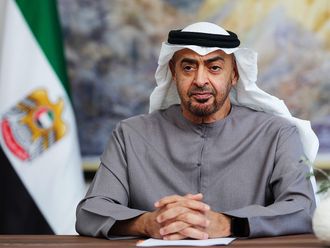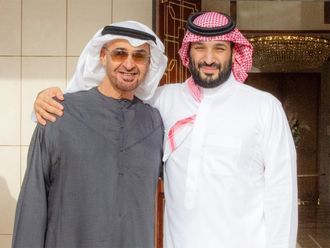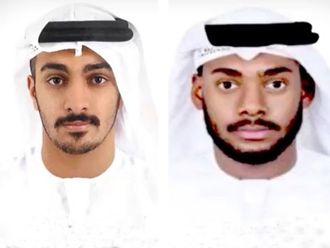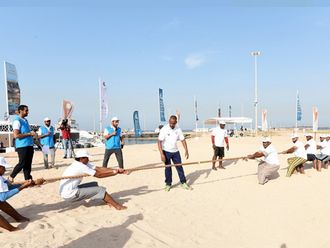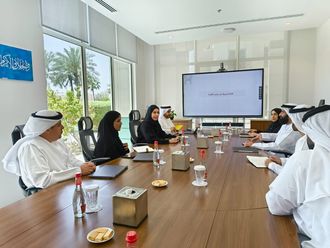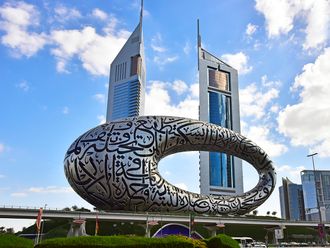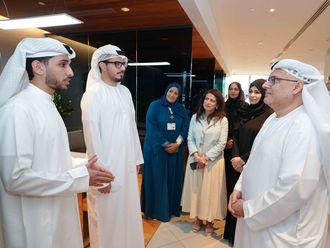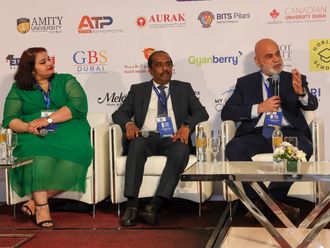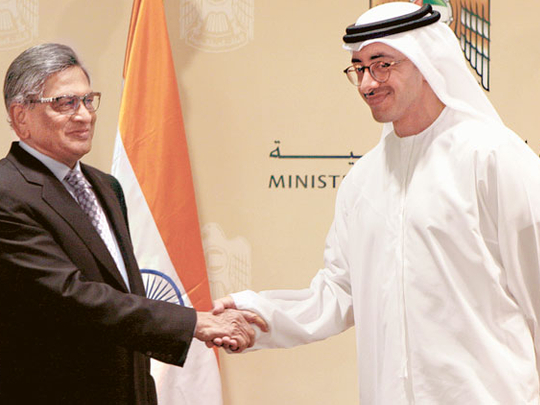
Dubai Foreign Minister Shaikh Abdullah Bin Zayed Al Nahyan Monday urged Iran to listen to reason, extending yet another invitation to Tehran to join negotiations over three islands occupied by Iran since 1971 or take the issue to international arbitration.
"With all my love, I appeal again to Iran to listen to reason to end this dispute, because it will not only affect the two countries and its people, but also threaten international peace and security — repercussions which cannot be contained by the UAE or Iran," Shaikh Abdullah told a joint news conference with visiting Indian External Affairs Minister, S.M. Krishna, in Abu Dhabi Monday.
Speaking on the eve of a special meeting by the GCC foreign ministers to discuss a series of diplomatic actions after the Iranian president visited the UAE's occupied island of Abu Mousa, Shaikh Abdullah said: "We have to have a clear agenda and a deadline for the negotiations to resolve the issue or take it to international arbitration at the International Court of Justice. We cannot keep this issue going on for ever."
Shaikh Abdullah stressed the importance of maritime security in the Gulf as "40 per cent of the world's energy literally go through the three islands near the mouth of the strategic Strait of Hormuz."
He blamed Tehran for failing to reach a solution to the issue. "We in the UAE are very serious about ending the conflict, but it seems that the Iranian regime for its domestic reasons is not so keen to do so. Maybe due to the slowdown in the economy, weak currency or inability to cope with international sanctions. Tehran wishes to transport its difficulties and divert the public's attention to a less important issue," he said.
Tehran Monday claimed things could become "very complicated" if Gulf states "do not act cautiously" over the UAE islands issue.
Earlier, Iranian Foreign Minister, Ali Akbar Salehi, said that although Iran wanted good relations with the UAE and was willing to hold discussions, but "our rule over the islands is not negotiable, and Iran's sovereignty over the islands is certain and on the record."
Speaking to Iran's Isna news agency, Salehi claimed the issue was a "misunderstanding" that could be resolved.
Regretfully, Shaikh Abdullah added, a neighbourly Islamic country with a time-honoured civilisation and traditions couldn't listen to reason and instead resort to exporting its domestic problems to others.
Shaikh Abdullah said he met on Sunday with the ambassadors of the permanent and non-permanent members of the UN Security Council and reiterated the UAE's condemnation of the provocative visit by Iranian President Mahmoud Ahmadinejad to Abu Mousa Island.
Shaikh Abdullah said that this visit represents a dangerous precedent and a flagrant violation of the UAE's sovereignty over its three occupied islands.
"The Iranian president's visit will not change historical and legal facts which prove the UAE's sovereignty over its three islands of Abu Mousa, and Greater and Lesser Tunbs, Shaikh Abdullah said.
He expressed the UAE's disappointment at the Iranian act which came in contradiction to the agreement between both countries to solve this dispute through bilateral negotiations.
Agreement
"The UAE has been committed to the two countries' agreement and has removed the issue from all resolutions and statements issued by the GCC and the Arab League. The issue was touched upon only in the UAE's statements before the UN general Assembly. But despite the positive gestures, we were taken aback by the Iranian provocation."
The Indian external affairs minister said he came to know about the issue from newspapers so he could not comment on it.
Shaikh Abdullah said Dr Anwar Mohammad Gargash, Minister of State for Foreign Affairs, summoned Mohammad Ali Fayadh, Iranian Ambassador to the UAE, and handed him a protest note denouncing the visit.
"The visit has undermined diplomatic efforts which led to an agreement for peaceful solution through bilateral negotiations. The UAE has committed to the agreement in order to create the right environment for a joint solution that could lead to enhancing security and stability in the Arabian Gulf," the note said.
It added that the UAE is committed to the agreement between the two countries to create appropriate environment for a joint solution which helps enhance security and stability in the Gulf region,
This approach stems from the UAE's belief in the need to place peaceful solutions over any other solutions, Dr Gargash said.
This approach emanates from the UAE's firm belief that peaceful solutions must prevail.
Trade: India largest partner
India is the UAE's largest trading partner, said Foreign Minister Shaikh Abdullah Bin Zayed Al Nahyan putting the trade volume between the two countries at $67 billion or nearly Dh246 billion last year.
India's External Affairs Minister S.M. Krishna said the country's bilateral trade with the UAE in 2010-2011 was estimated at $67 billion and was likely to increase to $70 billion in a year or a year-and-a-half.
Krishna said he was grateful to the UAE for providing care and protection to thousands of Indian workers.
The UAE is home to more than 1.70 million Indian expatriates, the largest community of overseas workers in the country.
Krishna met Shaikh Abdullah yesterday and presided over the 10th session of the India-UAE Joint Commission for Technical and Economic Cooperation.They discussed a range of issues relating to core interests, including energy security, investments and regional developments.


